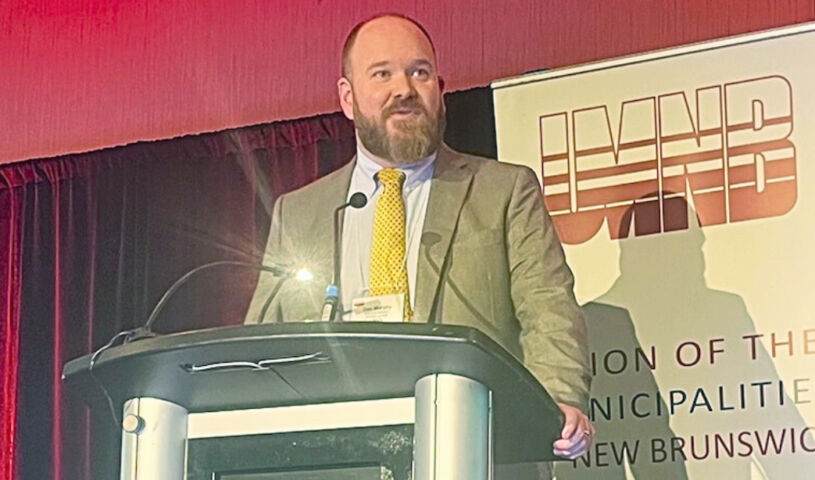N.B. municipalities adjust to reform, changing times
 Dan Murphy, executive director of the, Union of the Municipalities of New Brunswick, said the organization was kept busy in 2024 dealing with the impact of municipal restructuring across the province. Photo: Dan Murphy
Dan Murphy, executive director of the, Union of the Municipalities of New Brunswick, said the organization was kept busy in 2024 dealing with the impact of municipal restructuring across the province. Photo: Dan Murphy
Municipalities across New Brunswick faced the same challenges as their counterparts across the country in 2023. But they also had to address something unique to their circumstances: municipal restructuring.
The Local Governance Act was enacted across New Brunswick on Jan. 1 following local elections in November 2023. The results of this two-year effort saw the creation of 78 local governments and 12 rural districts. This new reality was down from the pre-existing 104 local governments and 236 local service districts.
Local Government Reform
Dan Murphy is executive director of the Union of the Municipalities of New Brunswick (UMNB). The challenges created by the reform efforts, Murphy said, are still being dealt with.
Even on top of “all the other day-to-day stuff” that municipalities must do, Murphy said there were added pressures to face. This meant the merging of two, three, or often even more municipalities into one. This meant combining multiple sets of bylaws and staff while still trying to figure out how everything was supposed to work.
As one would expect, Murphy said it has been a challenging time.
“It was the first year with our new municipalities. So a lot of way finding, a lot of building new community identities, tackling bylaw challenges,” Murphy said. “We’re still navigating the fiscal reform process. There were a lot of new people in municipal offices too. So for us, it was another year of transition.”
Finding Fiscal Balance
The biggest issue for New Brunswick municipalities is the same one seen across the country: the need for greater fiscal capacity.
Before Christmas, the province reported the viability of one-in-three municipalities is threatened. They’re going to have to find solutions to these fiscal challenges even after reform. As such, this is a big concern for UMNB as well. Murphy said that in New Brunswick, like in other provinces, the ongoing conversation is around what a new fiscal agreement for municipalities looks like.
The hope is that municipalities will have something to look forward to that isn’t solely based on property tax.
From the UMNB perspective, it’s also about recognizing the important role local government plays. Murphy said that if you want to build housing, you need local government. If you want to have people settle in communities, you need local government. As such, municipalities are the “linchpin for a lot of these things.” It is all the more crucial, Murphy added, as sometimes, municipalities aren’t treated like the “true partner at the table” that they need to be.
“Are there other ways to fund municipalities to make sure that they can meet the goals of reform, of building strong and vibrant communities,” Murphy said. “It feels like we’re making some progress. But we need a commitment to this, otherwise our municipalities are going to have a hard time.”
Struggle for Housing Continues
Municipalities across the province are dealing with homelessness, addictions, mental health challenges, and climate change. But the reality is, all these problems come back to the challenges of fiscal capacity. This is all-the-more-true when attention is focused on the housing crisis. No longer simply a “big city problem,” homelessness has reached the crisis point in communities both large and small.
In a New Brunswick context, Murphy points to the Town of St. Stephen. Town council declared a local state of emergency around homelessness after counting upward of 100 homeless people in their community of fewer than 5,000. Murphy called it “a staggering number,” even though the province stepped in to remove the declaration saying council was playing politics with the situation.
Murphy said he believes the reality is that the emergency declaration was actually “a small community crying out for help.” Local leaders were feeling overwhelmed and needed assistance. Homelessness hasn’t been a core municipal responsibility in New Brunswick. But the cost of living, the lack of housing, all these things are playing into a crisis that local governments must address.
Municipalities are dealing with this more and more, Murphy said. The problem may be more visible in larger cities such as Moncton and Fredericton. But the crisis is not only in these communities, but in other regional hubs as well.
“We’re all looking to work more collaboratively on how to fix this. But again, that has to come with resources and expertise that a lot of our communities just don’t have,” Murphy said. “It comes back to meeting a fiscal framework that makes sense in the 21st century as opposed to one that was set up for the 1870s.”
UMNB’s Hectic 2023
As busy as its members were kept in 2023, UMNB also faced numerous obstacles. Certainly the biggest change was the overall municipal landscape. But UMNB was also part of a seismic shift when it merged with the Cities of New Brunswick Association.
The goal, Murphy said, was to bring in the full complement of cities into one municipal association that can represent everybody. That was a big change, but it also spurred continued growth. UMNB continued to add new members, even in spite of municipal reform.
Murphy said UMNB now represents 56 of the new 78 municipalities. UMNB and the Association francophone des municipalités du Nouveau-Brunswick are the two municipal associations in New Brunswick.
UMNB is also growing internally. Murphy’s team is currently three people, but it is soon to be four as a new position was recently posted. Murphy stared with a staff of two just 30 months ago. That growth has been important, Murphy said, as the nature of UMNB’s work has changed drastically with municipal reform.
“We’re trying to figure out how we best support new communities. And we’ve got a lot of councillors and mayors, for instance, who’ve never been in a municipality before,” Murphy said. “So, how do we support them as they learn to run a municipality on top of all the other challenges that are happening? There’s no shortage of work, let’s put it that way.”
More Work on the Horizon
New Brunswick is looking at a provincial election next May. With that on the horizon, Murphy said a lot of municipal attention will be focused on detailed policy work and advocacy.
UMNB will be focused on making sure municipal priorities are part of the various party platforms. In fact, it is a process that has already started with meetings held, or scheduled, with the different caucuses. The goal, Murphy said, is getting the various municipal priorities on the table. Those priorities focus on fiscal capacity around issues such as policing, and infrastructure.
Murphy said policing occupies a big piece of the discussions as reform has caused additional challenges around it. For one thing, some communities now have two services – a municipal force and the RCMP – policing their communities.
Infrastructure is a big question, Murphy said. There are questions around building infrastructure for housing, but also how new municipalities will maintain their roads. After all, what happens to roads that were in unincorporated areas? These answers are still to come.
State of Local Government
While he is focused on the day-to-day, Murphy is also concerned about the state of local government in general.
Quebec, for example, has seen hundreds of local politicians walk away due to the hostile environment in the political realm. This includes the resignation of France Bélisle, the first female mayor of Gatineau, Que., who walked away over the toxic environment she was facing. In New Brunswick, Murphy said, there are similar situations as well. For example, in the community of Lakeland Ridges, divisions within the council led the province to appoint a supervisor to oversee operations. Murphy said Lakeland Ridges isn’t alone in facing challenges created by the municipal reform process.
“It’s not great,” Murphy said. “And we’ve had other issues where councils aren’t gelling quite as well as they could.”
But even with these situations bubbling under the surface, Murphy said he feels that – in general – the state of local government is strong. By and large, he added, there are a lot of “really great people” that are doing good work in their communities. That said, like anything else, there’s always room to be better.
For UMNB, that means offering up more training and resources to assist councils in their work. UMNB undertook an extra orientation conference last year, which Murphy said was beneficial to their members. The goal will be to continue that work in the years ahead.
“We’ve just embarked on a huge change management project and for a while, in some communities, it is going to be difficult to build that identity,” Murphy said. “We are there to support them and we work with the province to make sure that those communities have the resources they need.” MW
✯ Municipal World Executive and Essentials Plus Members: You might also be interested in the Fred Groves article: Twenty-five years later, amalgamation still on the backburner in Essex County.
Sean Meyer is digital content editor for Municipal World.
Related resource materials:



